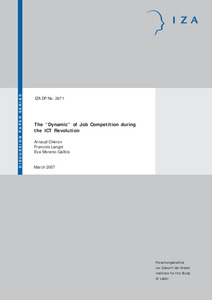The "dynamic" of job competition during the ICT revolution
"Our paper seeks to gain insights on the effect of labor market institutions on the evolution of overeducation (job competition), unemployment inequalities and job instability during the polarization process of the labor market fostered by the diffusion of novel technologies. Based on micro dat...
| Main Authors: | , , |
|---|---|
| Institution: | ETUI-European Trade Union Institute |
| Format: | TEXT |
| Language: | English |
| Published: |
Bonn
2007
IZA |
| Subjects: | |
| Online Access: | https://www.labourline.org/KENTIKA-19125720124919439029-The-dynamic-of-job-competition.htm |
| Summary: | "Our paper seeks to gain insights on the effect of labor market institutions on the evolution of overeducation (job competition), unemployment inequalities and job instability during the polarization process of the labor market fostered by the diffusion of novel technologies. Based on micro data, we first present some stylized facts characterizing the occidental countries' labor markets. We then develop an endogenous job destruction framework á la Mortensen and Pissarides (1994) where each individual is endowed with a given ability level. The process of contact between the set of heterogeneous workers and firms is represented by a traditional matching function. The segmentation of the labor market between workers having the required ability to occupy cognitive jobs (where novel technologies are used) and the rest of the workers occupying simple jobs is endogenously determined. Firms offering a cognitive job support a set up cost but ICT are assumed to improve their productivity. When simulated the model manages to reproduce the U-shaped path followed by the ability requirements needed in cognitive positions as ICT got increasingly diffused. Furthermore, we also draw conclusions concerning the evolution of job stability, the size of each labor market segment and the unemployment rates." |
|---|---|
| Physical Description: | 48 p. Digital |

